- Home
- Robert Goddard
Play to the End Page 3
Play to the End Read online
Page 3
“What is, in particular?”
“Well, him and now you, in the Cricketers on a Sunday night. What would you call that if it isn’t weird?”
“I’d call it coincidental.” (If it was true, which I rather doubted.) “Faintly coincidental.”
“Even so, you want to be careful. I’m not the superstitious type myself, but you actors are supposed to be. The Scottish play. The Superman curse. All that sort of malarkey.”
“I’ll try not to let it worry me.”
“Look, I’m an old Brighton hand. My ma had a bit part in Brighton Rock. And I’m in a crowd scene in Oh What a Lovely War! So, I almost feel like an honorary member of the acting profession. Anything I can do for you while you’re here—anything at all—just say the word. I’ll give you my mobile number.” He scrawled the number on a beer mat and thrust it into my palm. “Not much I can’t lay hands on or find out in this town. Know what I mean?” He winked.
Unsure whether I really wanted to know what he meant, I smiled weakly and pocketed the beer mat. “I’ll bear the offer in mind.”
“You do that, Toby.” He gave me a second, more exaggerated wink. “I wouldn’t like to think of you getting into trouble for the lack of a word to the wise.”
Shaking Syd off wasn’t easy. He was all for “going on somewhere.” I had to dredge up considerable reserves of charm to avoid offending him. Somehow, though, I doubt he takes offence easily. He can’t afford to with his personality.
Back here at the Sea Air I’ve had the opportunity to check Orton’s diaries for late July, 1967, which have raised more questions than they’ve answered. He and Halliwell arrived in Brighton on Thursday 27th and spent three days cooped up discontentedly at the Lewenstein house in Shoreham, leaving on Monday 31st. Just about the only time Orton was alone, oddly enough, was Sunday evening. He had gone with Halliwell and the Lewenstein family to see the new Bond film, You Only Live Twice, at the Odeon Cinema, but it was sold out. The others opted to see In Like Flint instead, but Orton preferred to cruise off in search of casual sex. He succeeded in getting himself sucked off by a dwarf in a public convenience. (Orton seems to have given the word convenience a very liberal interpretation.) Then he had a cup of tea at the railway station and walked back to Shoreham.
No mention of the Cricketers, then, nor of anyone who could be Sydney Porteous as an ignorant young shaver. Orton wasn’t much of a pub-goer by his own and others’ accounts. The incident doesn’t ring true. Syd, I conclude, was spinning a yarn.
Or was he? No Orton scholar for sure and certain, how did he manage to get as many facts right as he did? As it happens, Sunday, 30 July 1967 was the only evening when he could have met the great and soon to be late Joe Orton in a Brighton boozer.
Besides, I can’t deny that there’s something slightly disturbing about Porteous’s story. Orton’s weekend by the sea wasn’t wholly lacking in superstitious significance. His agent, the legendary Peggy Ramsay, had a house in Brighton. She met up with the party on Saturday night and they dropped by her place on the way out to dinner. There Orton made some characteristically scornful remarks about a horus she showed him—an Egyptian wood carving in the likeness of a bird, traditionally placed on graves to escort the souls of the departed to heaven. Peggy thought such disrespect was tempting fate. Sure enough—if you’re that way inclined—Orton was dead within a couple of weeks.
I’m not, of course, that way inclined. At least, I try not to be. But Eunice brought yesterday’s Argus up to me earlier, as I’d asked her to, and I see the Odeon is showing the latest Bond film. Just as it was in July 1967. I haven’t been to see it. I might have done, if only to glare in envy at Pierce Brosnan. But circumstances conspired to prevent me. Just as they prevented Orton.
And now I find myself keeping a diary of sorts. Just like Orton.
Thinking, drinking and talking. I’ve done too much of all three. I should get that early night I promised myself. But my body clock’s geared to the rest of the week, when I’ll be up till the small hours. I can’t seem to relax. I can stop talking, though. That at least is in my control. Besides, there really is nothing else to say. For now.
MONDAY
The alarm clock roused me at half past eight this morning, hora incognita as far as I’ve been concerned recently. Novelty did not lend enchantment to the experience. A squint through the window revealed a grey sky and a wind-driven burger carton bowling up the street. The man whose face I met in the shaving mirror didn’t look to be at his best.
He still wasn’t after breakfast and a walk down to the sea front. But I had a promise to keep. And it wasn’t going to wait until my biorhythms were in synch. I headed for the Lanes.
It was gone ten by the time I reached the Rendezvous, but not long gone. I spotted chummy as I moved at a practised amble towards the door, but didn’t look at him, any more than I glanced into Brimmers. A duffel-coated shape in the window seen from the corner of the eye was enough to justify the witheringly early start. Whether the proprietress of Brimmers was watching I didn’t know, though I hoped Jenny would have the good sense to lie low. This was one show that didn’t need an audience.
The Rendezvous was in a lull between workers looking for a caffeine fix and shoppers resting their feet. It aims for a Continental ambience, with lots of dark wood and sepia photographs of Third Republic Paris, but doesn’t quite hit the mark, thanks to the bright and breezy staff and manifestly uncontinental customers. Chummy was a case in point. The duffel-coat, jeans and desert boots were more Aldermaston March than Champs-Élysées. From where I parked myself with a double espresso and a complimentary Indie, I couldn’t make out what the badges were, but there had to be at least half a dozen of them on his coat, dimly reflected in the window through which he was gazing across the lane towards Brimmers. He had a book open in front of him, but it wasn’t getting much of his attention.
Nor was I, come to that, which called into question Jenny’s contention that I was the key to his interest in her. It also raised the issue of how I should best approach him, an issue I hadn’t really thought about beforehand. He didn’t have the video of Dead Against with him and had displayed no interest whatsoever in my arrival on the premises. He hadn’t so much as twitched a toggle in my direction.
My impression, based on a three-quarters profile view, was that Jenny had him about right. A middle-aged mummy’s boy, whether his mummy was still around or not. There was an obviously home-knitted sweater visible beneath his coat. His hair was a pudding-basin mop of brown and grey. The glasses perched halfway down his nose were about fifteen years out of fashion. When he drank from his cup, he used both hands to raise it cautiously to his lips. He wouldn’t have been out of place standing at the end of the platform, notebook in paw, as my train drew into Brighton station yesterday afternoon.
But stereotyping, as every actor knows, is a treacherous business, as miserable to experience as it can be misleading to apply. I needed to handle this sensitively. I followed up the espresso with a latte and cobbled together the least worst cover story I could contrive. Then I moseyed over to join him.
“Excuse me,” I said, “are you local?”
“Yes,” he replied, turning his head slowly to look at me. “I am.” He spoke as slowly as he moved, with a slight lisp. Recognition failed to flicker in his eyes.
“I’m a stranger to Brighton. I wonder if you could help me with some directions.”
“Maybe I could.”
The badges, I now realized, were actually painted enamel brooches, depicting characters from Hergé’s Tintin books: Captain Haddock, Snowy, Professor Calculus, the Thomson twins and, naturally, the legendary quiffed one himself. “I’m looking for the public library,” I pressed on. (Pretty lame, I know, but there it is.)
“It can be…difficult to find.” He smiled wanly. “They moved it, you see.”
“Did they?”
“It’s in New England Street.”
“Right. And that is…” My gaze drifted down to th
e book he’d been reading, which ironically had the yellowed margins and cellophaned cover of a library book. Then I noticed the title at the top of the page. The Orton Diaries. I said nothing, though my eyes must have widened in surprise.
And at that moment—of all the hellishly inconvenient ones—my mobile rang. “Someone’s after you,” said chummy, as I wrestled it out of my pocket.
“Sorry,” I blurted out. “Excuse me.” I had the blasted thing in my hand now. I turned and moved back to the table where I’d been sitting to answer. “Yes?” I snapped.
“Toby, it’s Brian. Not too early for you, I hope.”
If Brian Sallis, our indefatigable company stage manager, had woken me from a well-deserved lie-in, I’d have felt less irritated than I did. What in God’s name could he want? The question was swiftly, though to my mind far from adequately, answered.
“I just wanted to check you had a smooth journey yesterday.”
“I made it, yes.”
“Good.”
“Look, Brian—”
“You haven’t forgotten our press call this afternoon, have you?” So that was really why he’d phoned: to ensure I wasn’t likely to cop out of our meet-the-media session. “Two thirty, at the theatre.”
“I’ll be there.”
“With the technical to follow at four.”
Every Monday afternoon of the tour had been the same: press call at 2.30; technical rehearsal, to get the feel of a new stage, at 4.00. Brian could hardly have thought I’d forgotten the schedule. My state of mind was probably his more immediate concern and it was actually none too good, though for reasons he could have no inkling of. “I’ll be there,” I repeated. “OK?”
“Splendid. I just—”
“I’ve got to go now.”
“You are all right, aren’t you, Toby?”
“Fine. See you later. ’Bye.”
I ended the call before Brian had a chance to say his own goodbye and turned round to reengage chummy.
But he wasn’t there. His stool was empty, his coffee-cup drained and abandoned. Chummy, complete with Orton Diaries and Tintin badges, had vanished.
Cursing Brian Sallis, I grabbed my coat and rushed out. There was no sign of chummy, but in the narrow, doglegging Lanes, that was no surprise. Choice of direction boiled down to a fifty-fifty guess.
I looked in through the window of Brimmers as much in hope as apprehension. Jenny had either seen nothing, in which case she couldn’t help me, or she’d spectated at a pretty comprehensive balls-up, in which case…
Elegantly trouser-suited and severely unsmiling, brow furrowed in the only gesture of exasperation she could allow herself with customers present, she stared out at me along a narrow line of sight through the windowful of hats. I grimaced. And she inclined her head to the right.
I turned left, hurried round the next corner and headed on, scanning the shops and side turnings as I went. No glimpse of duffel rewarded my efforts and within a few minutes I was out in North Street, amidst traffic and noise and bustling passers-by.
Then, incredibly, I saw him, pacing up and down at a crowded bus stop on the other side of the road. He pushed his glasses up to the bridge of his nose with a stab of his middle finger and squinted expectantly in the direction from which a bus would come. A gathering of bags and folding of buggies amongst his companions at the stop signalled its imminent arrival even as I watched. I glanced to my left and saw a double-decker bearing down on them.
The bus had stopped and was loading by the time I managed to dodge across the road. I saw chummy stepping aboard and, peering through the window, spotted his desert boots as he took the stairs to the top deck. “Where’s this bus going?” I asked the harassed mother ahead of me and relayed her answer to the driver when I made it to the front of the queue. “Patcham, please.” But there turned out to be a flat fare of a pound. My destination was entirely up to me.
Actually, of course, it was up to chummy. I sat about halfway back downstairs and awaited his descent. The bus lumbered round by the Royal Pavilion, took on more passengers and headed north.
Ten minutes slow going took us up London Road to within sight of the Duke of York’s Cinema. Several people got up as we approached a stop. Then the desert boots appeared round the corner of the stairs. Chummy was on the move. I rose discreetly behind a broad-backed youth and was last but one off the bus.
Chummy was walking north by then, towards the traffic lights at the junction ahead. I followed at what I judged to be a safe distance, lingering in a shop doorway as he reached the lights and waited for them to change, then hurrying after him as he crossed.
He was heading east now, along Viaduct Road, where heavy traffic roared past dingy Victorian terraces. He plodded along, head bowed, displaying not the slightest interest in his surroundings, nor any inclination to glance over his shoulder. It seemed to me that if he’d left the Rendezvous so abruptly because I’d aroused his suspicion, he should have been warier. I concluded that he’d more probably left because he was ready to; as simple as that—I was irrelevant.
I saw him dig a bunch of keys out of his pocket a few seconds before he stopped by the door of a house dingier even than most of its neighbours and let himself in. I heard the door clunk shut as I approached. I carried on walking, noting the number as I passed: 77. Then I stopped and doubled back at a slower pace for a second, more lingering look.
Number 77 was a standard two-up, two-down Victorian working-class dwelling, rendered in a shade of blue darkened by grime and neglect. Paint was peeling from the sash window frames. The front door was not original, being plain and unpanelled, but it wasn’t in much better condition than the rest of the house.
I’d slowed nearly to a halt, my brain struggling with the problem of what to do next. I’d discovered where he lived. It was something. But it was a long way short of enough. Perhaps I should try the knocker, though if he answered I’d only have another problem to grapple with: how to explain myself.
Then the door suddenly opened. And chummy stared out at me. “Do you want to come in, Mr. Flood?” he asked.
“Well, I…”
“You may as well, seeing as you’ve come this far.”
There was logic in that. There was also a hint of menace. But that could merely have been a symptom of guilt on my part. I felt more than a little foolish. “You know who I am?”
“Yes.”
“You have me at a disadvantage, in that case.”
“My name’s Derek Oswin.” He pushed his glasses up on his nose again. “Are you coming in?”
“All right. Thanks.”
I stepped past him into a cramped hallway. Steep, narrow stairs straight ahead led to the upper floor. To my right was a sitting room, with a kitchen at the end of the hall. The sitting room looked to be anciently furnished, but tidy. The condition of the exterior had prepared me for a scene of squalor, but what met my eyes was the complete reverse.
The front door closed behind me. “Can I take your coat?” Oswin asked.
“Er…Thanks.” I took it off and he hung it next to his duffel-coat on one of three wall-mounted hooks. The hall wallpaper was some kind of anaglypta, in a pattern I seemed vaguely to recognize. It’s the sort of thing one of my great aunts would have chosen and very possibly did.
“Would you like a cup of tea?” Oswin enquired.
“OK. Thanks.”
“I’ll turn the kettle on. Go through.” He flapped a hand towards the open door behind me. I turned and stepped into the sitting room while he padded off to the kitchen.
The room was small and spotlessly clean, dominated by a sage-green three-piece suite. There was a television and video player in one corner and a bookcase in another, either side of a tiny tile-flanked fireplace. The walls were papered in the same pattern of anaglypta as the hall. Derek Oswin’s parents—or maybe his grandparents—had obviously decided to keep it simple.
“I’m afraid I’ve run out of biscuits,” my host announced, reappearing in the doo
rway.
“Don’t worry about it.”
“I expect you’re wondering…how I know who you are.”
“And why you pretended not to back at the Rendezvous.”
“Yes.” He grinned nervously. “Quite.” Then the kettle began to whistle. “Excuse me.”
He vanished again and I took another look around the room, spotting the video of Dead Against lying on top of the bookcase. It turned out to be just the plastic cover, however. The video itself had been removed. The picture on the front of the cover showed Nina Bronsky in her black leather hit-woman’s gear. I’d only been given a head-and-shoulders shot on the back.
“Here we are,” said Oswin, reappearing once more, this time with a teapot, two mugs and a bottle of milk on a tray. He set the tray down on the small coffee-table next to the sofa. “I hope you don’t want sugar. I…never touch it.”
“Just milk is fine.” I held up the video. “One of my questions is answered.”
“Not really.”
“No?”
“I didn’t need that to recognize you, Mr. Flood. I remember you as Hereward the Wake.”
This was a genuine surprise. My TV début a quarter of a century ago in a studio-bound series about the legendary leader of resistance to the Norman Conquest is a vague memory even for me.
“I’ve always been a fan of yours.” Oswin broke off to pour the tea. “Won’t you sit down?” He lowered himself into an armchair. I took one end of the sofa and added some milk to my mug. It was a Charles and Di wedding souvenir mug, I noticed, as was Oswin’s. “I bought a dozen,” he explained, seeming to sense that he needed to. “As an investment.”
“You shouldn’t use them, in that case.”
“Don’t worry. It was a very poor investment.”
I sipped some tea. “What’s this all about, Mr. Oswin?”
“Call me Derek. Please.”
“OK. Derek. Why are you bothering my wife?” It seemed pointless now to pretend Jenny hadn’t put me onto him. It seemed indeed that “Derek” had foreseen everything that had happened.

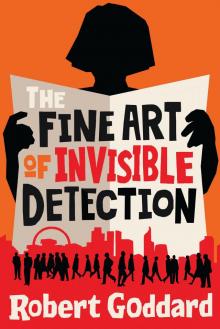 The Fine Art of Invisible Detection
The Fine Art of Invisible Detection One False Move
One False Move Panic Room
Panic Room Beyond Recall
Beyond Recall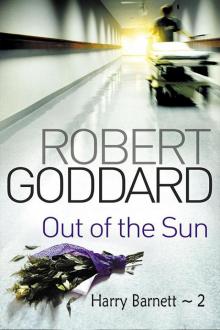 Out of the Sun
Out of the Sun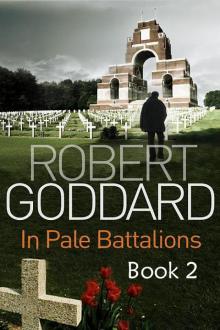 In Pale Battalions - Retail
In Pale Battalions - Retail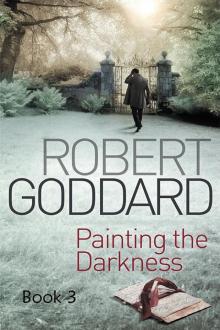 Painting The Darkness - Retail
Painting The Darkness - Retail The Corners of the Globe
The Corners of the Globe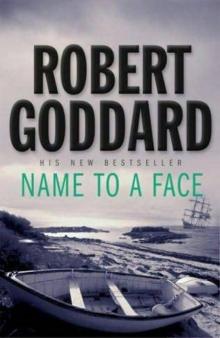 Name To a Face
Name To a Face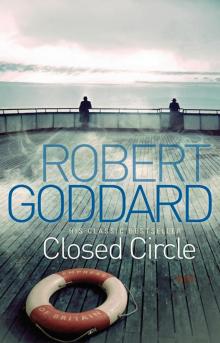 Closed Circle
Closed Circle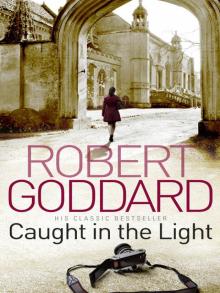 Caught In the Light
Caught In the Light Into the Blue
Into the Blue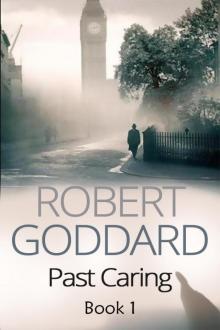 Past Caring - Retail
Past Caring - Retail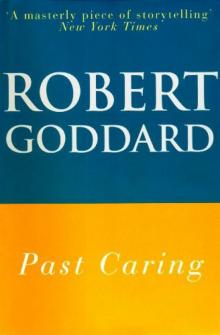 Past Caring
Past Caring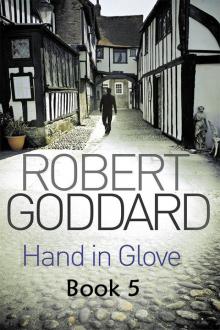 Hand In Glove - Retail
Hand In Glove - Retail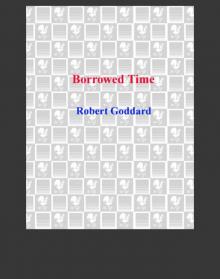 Borrowed Time
Borrowed Time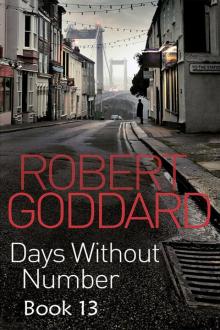 Days Without Number
Days Without Number James Maxted 03 The Ends of the Earth
James Maxted 03 The Ends of the Earth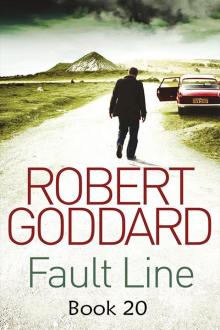 Fault Line - Retail
Fault Line - Retail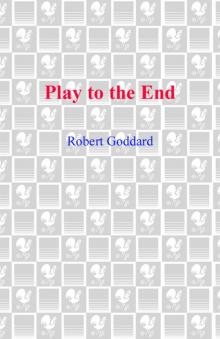 Play to the End
Play to the End Sea Change
Sea Change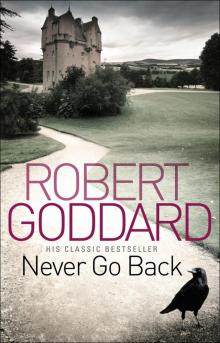 Never Go Back
Never Go Back Take No Farewell - Retail
Take No Farewell - Retail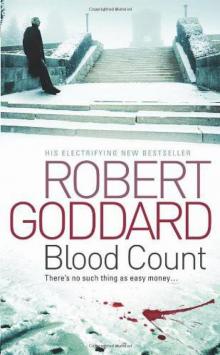 Blood Count
Blood Count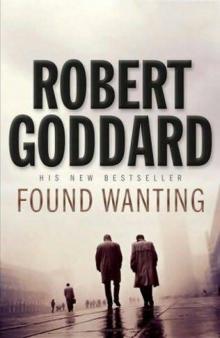 Found Wanting
Found Wanting Sight Unseen
Sight Unseen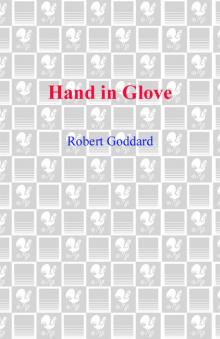 Hand in Glove
Hand in Glove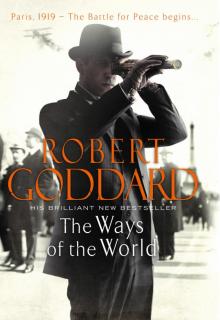 The Ways of the World
The Ways of the World